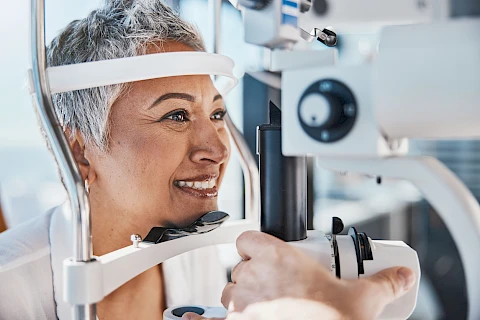
October is Blindness Awareness Month, an important time to focus on eye health. Many seniors experience some degree of vision decline, which can affect their daily lives. Caregivers and family members play a vital role in recognizing signs of fading eyesight. By identifying these signs early, we can help seniors maintain their quality of life.
Vision Decline in Seniors: What You Need to Know
Aging can naturally affect our eyesight. Our eyes age just like the rest of our bodies. As we grow older, changes such as reduced pupil size and dry eyes can impact vision. Medical conditions are also common culprits of eyesight decline. Seniors are more likely to develop cataracts, glaucoma, and age-related macular degeneration. These conditions can significantly impair vision if not detected early.
Early detection is important to preserving vision because once recognized, many of these conditions can be managed or treated to slow down vision loss. Proactive steps can ensure seniors remain independent and enjoy their daily activities.
Signs of Worsening Vision in Seniors
Here are some symptoms that can indicate vision loss:
- Clumsiness or frequent tripping: If a senior is bumping into things or tripping more often, it might be an indication that they're having trouble seeing clearly.
- Difficulty reading small print: Seniors often find it challenging to read smaller print and may require more light to see well. This could mean their eyesight is deteriorating.
- Complaints of blurry vision or seeing halos around lights: Blurry vision is a common complaint among seniors with vision issues. Seeing halos around lights, especially at night, can also signal a problem.
- Headaches or eye strain during reading or screen time: These can occur if the eyes are too tired from trying to focus on reading or watching screens.
- Squinting or tilting the head to see better: These behaviors might suggest that the senior is struggling to see clearly.
- Avoidance of activities that require pristine vision, like driving: If a senior is less willing to drive, it might be because their vision makes it unsafe or uncomfortable.
- Increased sensitivity to glare or light: Heightened sensitivity can indicate potential changes in eye health.
Next Steps for Caregivers
Take action right away if you notice any of these signs. Caregivers should schedule regular eye exams with an optometrist at least every two years to monitor eyesight and catch any issues early. It's also important to discuss concerns with a primary care doctor, as vision problems could be linked to other health issues.
Exploring vision aids and adaptive technologies can help seniors to more effectively manage daily tasks. Tools such as magnifying glasses or screen readers can make a significant difference in their ability to perform everyday activities.
Encouraging a healthy lifestyle is another necessary step. Diet, exercise, and not smoking can positively influence eye health. Caregivers should support seniors in following a lifestyle that promotes good vision care.
Stay Eye Healthy With Senior Helpers
Early recognition and intervention in vision issues can significantly enhance a senior's quality of life. Caregivers and family members need to stay alert for any signs of declining eyesight. With the right guidance and care, seniors can continue to lead fulfilling and independent lives.
For personalized senior care services in the Green Valley, Oro Valley, Vail, Sahuarita, and Marana areas, contact us at Senior Helpers Tucson Southeast today.